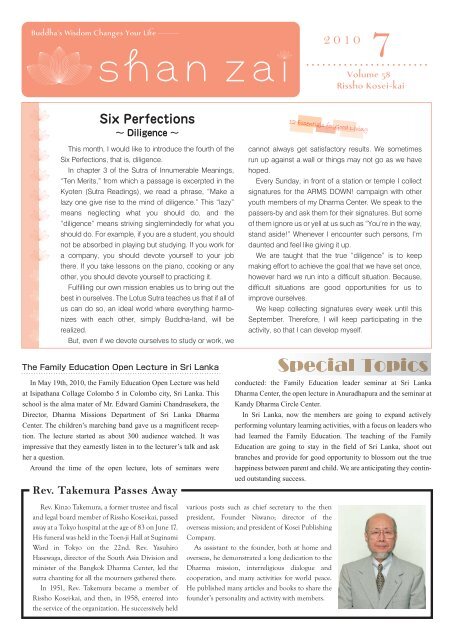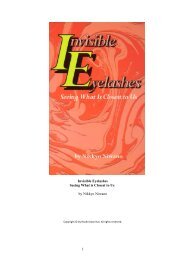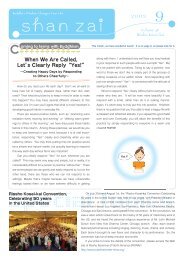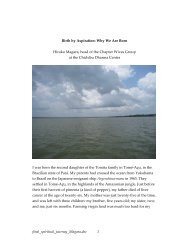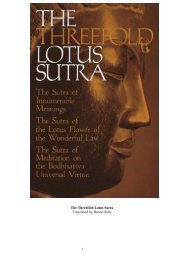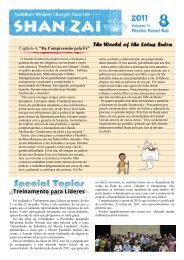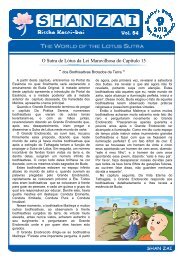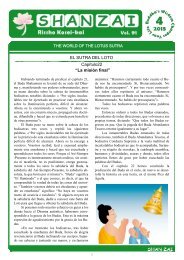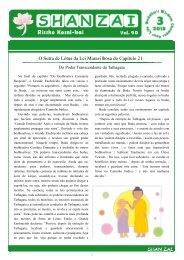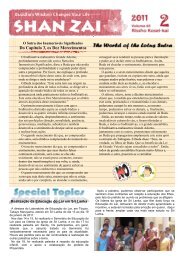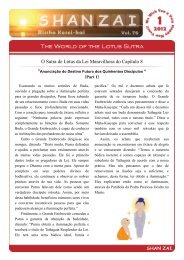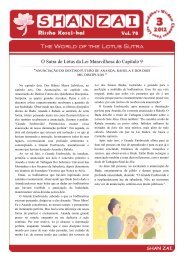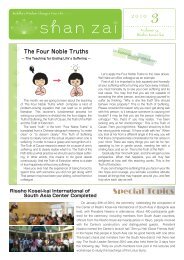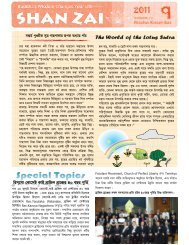1007SHAN-ZAI_English.. - Rissho Kosei-kai
1007SHAN-ZAI_English.. - Rissho Kosei-kai
1007SHAN-ZAI_English.. - Rissho Kosei-kai
Create successful ePaper yourself
Turn your PDF publications into a flip-book with our unique Google optimized e-Paper software.
Buddha's Wisdom Changes Your Life<br />
7<br />
Volume 58<br />
<strong>Rissho</strong> <strong>Kosei</strong>-<strong>kai</strong><br />
2010<br />
<br />
<br />
This month, I would like to introduce the fourth of the<br />
Six Perfections, that is, diligence.<br />
In chapter 3 of the Sutra of Innumerable Meanings,<br />
“Ten Merits,” from which a passage is excerpted in the<br />
Kyoten (Sutra Readings), we read a phrase, “Make a<br />
lazy one give rise to the mind of diligence.” This “lazy”<br />
means neglecting what you should do, and the<br />
“diligence” means striving singlemindedly for what you<br />
should do. For example, if you are a student, you should<br />
not be absorbed in playing but studying. If you work for<br />
a company, you should devote yourself to your job<br />
there. If you take lessons on the piano, cooking or any<br />
other, you should devote yourself to practicing it.<br />
Fulfilling our own mission enables us to bring out the<br />
best in ourselves. The Lotus Sutra teaches us that if all of<br />
us can do so, an ideal world where everything harmonizes<br />
with each other, simply Buddha-land, will be<br />
realized.<br />
But, even if we devote ourselves to study or work, we<br />
cannot always get satisfactory results. We sometimes<br />
run up against a wall or things may not go as we have<br />
hoped.<br />
Every Sunday, in front of a station or temple I collect<br />
signatures for the ARMS DOWN! campaign with other<br />
youth members of my Dharma Center. We speak to the<br />
passers-by and ask them for their signatures. But some<br />
of them ignore us or yell at us such as “You’re in the way,<br />
stand aside!” Whenever I encounter such persons, I’m<br />
daunted and feel like giving it up.<br />
We are taught that the true “diligence” is to keep<br />
making effort to achieve the goal that we have set once,<br />
however hard we run into a difficult situation. Because,<br />
difficult situations are good opportunities for us to<br />
improve ourselves.<br />
We keep collecting signatures every week until this<br />
September. Therefore, I will keep participating in the<br />
activity, so that I can develop myself.<br />
<br />
In May 19th, 2010, the Family Education Open Lecture was held<br />
at Isipathana Collage Colombo 5 in Colombo city, Sri Lanka. This<br />
school is the alma mater of Mr. Edward Gamini Chandrasekera, the<br />
Director, Dharma Missions Department of Sri Lanka Dharma<br />
Center. The children’s marching band gave us a magnificent reception.<br />
The lecture started as about 300 audience watched. It was<br />
impressive that they earnestly listen in to the lecturer’s talk and ask<br />
her a question.<br />
Around the time of the open lecture, lots of seminars were<br />
Rev. Takemura Passes Away<br />
conducted: the Family Education leader seminar at Sri Lanka<br />
Dharma Center, the open lecture in Anuradhapura and the seminar at<br />
Kandy Dharma Circle Center.<br />
In Sri Lanka, now the members are going to expand actively<br />
performing voluntary learning activities, with a focus on leaders who<br />
had learned the Family Education. The teaching of the Family<br />
Education are going to stay in the field of Sri Lanka, shoot out<br />
branches and provide for good opportunity to blossom out the true<br />
happiness between parent and child. We are anticipating they continued<br />
outstanding success.<br />
Rev. Kinzo Takemura, a former trustee and fiscal<br />
and legal board member of <strong>Rissho</strong> <strong>Kosei</strong>-<strong>kai</strong>, passed<br />
away at a Tokyo hospital at the age of 83 on June 17.<br />
His funeral was held in the Toen-ji Hall at Suginami<br />
Ward in Tokyo on the 22nd. Rev. Yasuhiro<br />
Hasewaga, director of the South Asia Division and<br />
minister of the Bangkok Dharma Center, led the<br />
sutra chanting for all the mourners gathered there.<br />
In 1951, Rev. Takemura became a member of<br />
<strong>Rissho</strong> <strong>Kosei</strong>-<strong>kai</strong>, and then, in 1958, entered into<br />
the service of the organization. He successively held<br />
various posts such as chief secretary to the then<br />
president, Founder Niwano; director of the<br />
overseas mission; and president of <strong>Kosei</strong> Publishing<br />
Company.<br />
As assistant to the founder, both at home and<br />
overseas, he demonstrated a long dedication to the<br />
Dharma mission, interreligious dialogue and<br />
cooperation, and many activities for world peace.<br />
He published many articles and books to share the<br />
founder’s personality and activity with members.
Guidance by President Niwano<br />
Saying “Thank You” with Sincerity<br />
President of <strong>Rissho</strong> <strong>Kosei</strong>-<strong>kai</strong> Nichiko Niwano<br />
<br />
<br />
July is the season of the Bon festival, when many<br />
Japanese return from the cities to their hometowns<br />
and visit family graves.<br />
The age-old Japanese custom of visiting the<br />
family grave is an expression of our debt of gratitude,<br />
since we recognize that it is thanks to our<br />
ancestors that we exist here and now.<br />
The agricultural expert Ninomiya Sontoku (1787<br />
1856) of Japan’s late Edo period (16031868),<br />
struck by the continuity of life traced down through<br />
his ancestors, wrote the following short didactic<br />
poem: “My mother and father, and their mothers<br />
and fathers, too, reside in me. So I respect myself,<br />
and revere myself.” He teaches us in these words<br />
that the best way to express gratitude to deceased<br />
parents and ancestors is to revere and respect our<br />
own lives.<br />
As our way of showing that we are grateful for<br />
being given life as a link in a long chain of lives<br />
from our ancestors, there is certainly no higher<br />
expression of this than respecting and revering our<br />
own lives—the most recent link of succession from<br />
their lives. When we think in this way, the time for<br />
remembering and honoring our ancestors gives us<br />
an opportunity to take a fresh look at our own lives.<br />
Visiting the family grave and expressing gratitude<br />
to those ancestors is, thanks to established<br />
custom, comparatively easy to do. Yet for many<br />
people it seems to be very difficult to utter even the<br />
words “thank you” to living family members who<br />
are before their very eyes.
People are not always able to say “thank you”<br />
sincerely, even when they receive an act of kindness<br />
or an expression of goodwill from someone, if<br />
they are experiencing some trouble or their minds<br />
are occupied with something else. Once we have<br />
rid ourselves of self-centeredness, of a desire to<br />
show off, or of suspicions and distrust, words of<br />
gratitude will then come naturally, and from being<br />
grateful harmony with others will develop.<br />
Furthermore, offering words of gratitude is a way<br />
of showing respect for other people and acknowledging<br />
their humanity. This is one and the same<br />
with the feeling we demonstrate by putting our<br />
hands together reverently before other people. So<br />
when someone does a favor for us, we should<br />
immediately acknowledge it by saying “thank you”<br />
to them.<br />
To accept someone’s kindness and goodwill<br />
gratefully can be said to be an embodiment of the<br />
minds of the Buddha and the bodhisattva. That our<br />
words of gratitude can put a situation at ease is due<br />
to the praise of the gods and the buddhas, who<br />
proclaim “good! good!” Therefore, regardless of<br />
what we may personally think in certain circumstances,<br />
it is important that we always say “thank<br />
you,” because doing so brings happiness to others.<br />
Moreover, when we find ourselves the target of<br />
angry or unpleasant words, if instead of responding<br />
in the same way we could say, “Thank you for<br />
saying so,” the atmosphere might change completely.<br />
We would feel more relaxed and be able to<br />
comfortably accept the situation.<br />
In this regard, the single Japanese word to<br />
express thanks, arigato, truly has extraordinary<br />
power. The origin of the word is the expression<br />
used by people from ancient times to thank the<br />
gods and the buddhas for bringing about something<br />
that seemed impossible, arigatashi. For this reason<br />
we can say that the Japanese word arigato has a<br />
greater depth of meaning than most words to<br />
express gratitude in foreign languages.<br />
In this world that functions according to the law<br />
of dependent origination, many things remain<br />
unknown and mysterious to us. And yet our gratefulness<br />
to the gods and the buddhas continues.<br />
Furthermore, as propounded in Zen Buddhist tradition<br />
by the term “Beyond the Buddha,” we human<br />
beings must never forget our feelings of gratitude<br />
and humility for being able to walk the infinite path<br />
leading to the wisdom of the Buddha.<br />
According to the Suttanipata, Shakyamuni said,<br />
“To be humble and polite in manner, to be grateful<br />
and content in a simple life, not missing the occasion<br />
to learn the Dharma―this is the greatest happiness.”<br />
He is telling us that there can be no greater<br />
joy than respecting the lives of ourselves and<br />
others, aiming to improve ourselves while never<br />
forgetting to be humble, and accepting whatever<br />
may occur with a smile and “thank you.”<br />
Even among members of a single family and in<br />
different organizations, large and small, relations<br />
among people these days often seem to be characterized<br />
by friction and discord, leading to feelings<br />
of helplessness. Just remembering to always say<br />
“thank you” can release feelings of warmth and<br />
tenderness. Let us all agree to take the initiative in<br />
making this a regular practice.<br />
From <strong>Kosei</strong>, July, 2010. Translated by <strong>Kosei</strong> Publishing Company.
In the Footsteps of the Founder<br />
K a i s o - s a m a n i N a r a i t e<br />
President-designate of <strong>Rissho</strong> <strong>Kosei</strong>-<strong>kai</strong> Kosho Niwano<br />
Kaisosama<br />
ni Naraite<br />
<br />
<br />
“The most deeply fundamental repentance arises from a keenly felt recollection of<br />
the fact that we are being sustained to live by the Buddha. This recollection leads<br />
us to reevaluate what we have done and reflect, ‘I am being sustained to live by the<br />
Buddha, but have my actions been consistent with this fact?’”<br />
(Niwano Nikkyo Howa Senshu [Selected Sermons of Nikkyo Niwano],<br />
special volume, p. 158)<br />
Founder Nikkyo Niwano said, “Nothing is more precious than sincere repentance.<br />
People who can sincerely repent soon find liberation.”<br />
Repentance does not mean simply looking back on your past actions and feeling<br />
regret; it means repenting the fact that you were unable to see reality as it is, thus<br />
failing to perceive what the Buddha was expecting from you at the time. This is what<br />
repentance means for people on the Buddhist path.<br />
With true repentance, the real reason why a problem occurred becomes apparent.<br />
The real reason is not the cause of the problem but rather the purpose of the<br />
problem.<br />
“Here we are clearly told that the highest form of repentance is to perceive things<br />
as they really are—to realize the true aspect of all things.”<br />
(Shinshaku Hokke Sambu-kyo [New Commentary of the Threefold Lotus Sutra],<br />
vol. 10, p. 172)<br />
When we are unable to draw close to the Buddha is when we are seeing things in<br />
simple terms of black and white, or right and wrong. It is important for us to seek<br />
greater happiness, and try to avoid making the same mistakes over and over again.<br />
However, the world of the Lotus Sutra is not one in which we see things in terms<br />
of right or wrong, and try to change what we perceive as evil in ourselves. When we
can realize the Buddha’s wish that transcends questions of right and wrong, our<br />
spirits are released from suffering and we awaken to the feeling: “Oh, so that is it!<br />
This is the purpose for which I am living.” With that realization, where we are living<br />
in the here and now is transformed into the world of the Lotus Sutra, a world that is<br />
like the blossom in the sutra’s title, growing out of the muddy water and bursting<br />
into bloom.<br />
“Repentance in Buddhism involves strict and constant scrutiny of the preciousness<br />
of your true nature as well as of your actual imperfections.”<br />
(Niwano Nikkyo Howa Senshu [Selected Sermons of Nikkyo Niwano],<br />
special volume, p. 156)<br />
I once knew of a young woman whose general health was so poor that she often<br />
had to go to the hospital to receive an intravenous drip. Unfortunately, her veins<br />
were too small in diameter to easily accommodate the needle. The physician always<br />
had to search for a suitable blood vessel and try several times before he was able to<br />
insert the needle successfully. This was a painful process, and the young woman soon<br />
felt angry at the doctor every time she had to receive the treatment.<br />
One day when she was attending a <strong>Rissho</strong> <strong>Kosei</strong>-<strong>kai</strong> meeting, she burst out with<br />
an angry remark about her situation, asking, “Does my doctor always have to put me<br />
through this pain? He must not be a very good doctor; isn’t there another one who<br />
could do a better job?”<br />
Learning of this outburst, the founder met her and said, “Your physician is also<br />
having a hard time every time he gives you the intravenous treatment. Don’t you<br />
think you are lucky to have a doctor who is willing to go to that much trouble for<br />
you? If putting the blame on him could help to cure you, that would be a good thing.<br />
But that is not what faith teaches us.”<br />
The young woman caught her breath. She realized in her heart that she had been<br />
displaying the wrong attitude, because she understood that her sessions at the hospital<br />
also had the purpose of teaching her how to venerate all people. After this realization,<br />
she then always was gracious and spoke politely to her doctor while he was<br />
treating her.<br />
The founder’s words enabled her to repent, and so her displeasure could turn<br />
into gratitude. She then became able to recognize her situation as advantageous,<br />
and could be happy.<br />
The more often we turn our gaze toward the precious gifts we are receiving, the<br />
more joy we feel and thus are able to live happier and richer lives. To repent means<br />
to recognize in what spirit we should be leading our lives. This involves our realization<br />
that we should be communicating with words that originate from our buddhanature.<br />
That is why it is said that “repentance is joy.”
President-designate Kosho Niwano<br />
President Nichiko Niwano’s oldest daughter, Rev. Kosho Niwano was<br />
born in Tokyo. After graduating with a degree in Law from Gakushuin<br />
University, she studied at Gakurin Seminary, the training institution for<br />
<strong>Rissho</strong> <strong>Kosei</strong>-<strong>kai</strong> leaders. Presently, as she studies the Lotus Sutra, she<br />
continues to act as President-designate, making speeches for participants<br />
in the main ceremonies of <strong>Rissho</strong> <strong>Kosei</strong>-<strong>kai</strong>, and handling<br />
activities for interfaith cooperation at home and abroad. Married to<br />
Rev. Munehiro Niwano. Mother of one son and three daughters.<br />
“When our hearts repent and we feel purified, our hearts become responsive to<br />
the heart of the Buddha in an instant.”<br />
(Founder’s Dharma Talk at Fumon Hall, Tokyo, on September 23, 1973)<br />
What the Buddha wishes for us is that we realize our buddha-nature. We repent<br />
not in order to solve our problems, but rather to recognize our own buddha-nature.<br />
When we do so and our point of view shifts to that of the Buddha, which sees the<br />
world of liberation, we realize that our suffering occurs to lead us along the path to<br />
the attainment of buddhahood. For that we can rejoice.<br />
Because the problems we face are in fact placed on our path to liberation by the<br />
Buddha, when we realize this we can begin to overcome those problems. When we<br />
recognize the Buddha’s wish and open ourselves up to our own buddha-nature, bad<br />
situations have a way of reversing themselves and our problems begin to disappear.<br />
Repentance as described and taught in the Lotus Sutra equals the attainment of<br />
buddhahood by ourselves together with others.<br />
Kaiso-sama ni Naraite
The Gift That Cancer Gave Me<br />
piritual<br />
SJourney<br />
Part 3<br />
by Rev. Koichi Kawamoto, Minister of Takefu Dharma Center<br />
True to his words, he went to the headquarters<br />
to receive the Gohonzon and<br />
brought it home. Strangely enough, from<br />
the next day forward, their son (who had<br />
shut himself up in his room for eleven<br />
years) started to go out for work.<br />
After Ms. A decided to receive the<br />
Gohonzon, she reflected on herself, and<br />
gradually became aware of the state of<br />
her own mind in the practice of being<br />
humble to her father and husband. She<br />
honestly reflected on this, decided to<br />
correct her own attitude, and gradually<br />
changed. When her way of thinking<br />
changed, her son began to candidly<br />
complain about Ms. A. That means that<br />
* This personal testimony was shared at the monthly ceremony for the Founder’s memorial<br />
day on April 4 in 2010 at the Great Sacred Hall. This is the third of three installments.<br />
When Ms. A asked her father (who had suffered a stroke), “Is your meal is<br />
OK like this?” he replied “Thank you.” These were unexpected words to Ms.<br />
A. Before then, she thought her father was the kind of person who could not<br />
express his gratitude. But in 1fact, he was. She recognized her father was willing<br />
to pitch in help to renovate their house and to say thank you. Ms. A felt very<br />
sorry for him.<br />
In addition, through the practice of guiding other members to religious<br />
activities, she began to reflect on herself. She gained new understanding in a<br />
conversation with her son. Gradually she became aware that she didn’t listen to<br />
her son or pay attention to how he felt. Around that time, her son said to her,<br />
“You are doing the same thing that Grandpa does. You don’t really listen to<br />
others. You are selfish.” She thought to herself, “That’s true,” and she said to<br />
him, “I’m sorry. I’ll try. Expect me to be better.” Her son responded, “OK.” She<br />
eventually came to think, “My husband is a good person,” through her practice<br />
of guiding a married couple who had been quarreling.<br />
The head of the chapter taught Ms. A, “Ask your husband to go to headquarters<br />
to receive the Gohonzon.” She was troubled by what she had to say to her<br />
husband, who was opposed to <strong>Rissho</strong> <strong>Kosei</strong>-<strong>kai</strong>. Finally Ms. A asked her<br />
husband, “Tomoko now has a boyfriend. Could you go to headquarters for our<br />
daughter?” and he said, “OK, I will.”<br />
234<br />
Ms. A had been transformed into a<br />
person whom her son was willing to<br />
share complaints with! She was also<br />
aware of how deeply her husband cared<br />
about their son. Ms. A had a true experience<br />
of her world changing.<br />
Through being involved in guiding<br />
Ms. A (together with the chapter head), I<br />
felt how wonderful guiding members to<br />
the faith truly was. I was capable of<br />
changing my perspective on things and<br />
people, if I reflected on myself through<br />
the practice of guidance. After Ms. A<br />
received the Gohonzon, things around<br />
her gradually became more harmonious.<br />
I also reflected on whether I had been<br />
interacting with people with a genuine<br />
heart and mind. These insights came to<br />
me when I saw the attitude of the two<br />
people through their relationship: the<br />
chapter head was trying very hard to be<br />
sincerely involved with Ms. A for her<br />
happiness, while Ms. A was honestly<br />
trying to respond to the chapter head.<br />
Ms. A is now full of joy and gratitude,<br />
which provides a positive influence on<br />
her neighborhood group leaders. They<br />
are involving themselves in the practice<br />
of guiding both members and nonmembers<br />
to the teaching. Ms. A really<br />
wants the leaders to receive the Gohonzon<br />
and become more happy. I really do<br />
think all my members are wonderful.<br />
We are taught that the world around us<br />
will change according to how much we<br />
sincerely listen to another person, and<br />
what sort of attitude and words we have<br />
toward him or her. We can see that the<br />
realm of the Buddha manifests itself<br />
according to how we relate to others.<br />
I would like to take this opportunity to<br />
pledge to devote myself with diligence to<br />
the practice of being truly useful to<br />
members.<br />
Thank you for your kind attention.<br />
<br />
Shanzai welcomes your religious experience.Why don't you share your religious experience through Shanzai with members all<br />
over the world?Please send the script or inquiry to the email address; shanzai.rk-international@kosei-<strong>kai</strong>.or.jp. Thank you.
An Attitude That Brings You Blessings<br />
<br />
Sometimes I think about how I could have come this far in<br />
life without making huge mistakes, even in the midst of such<br />
hard work.<br />
During the time when I was founding <strong>Rissho</strong> <strong>Kosei</strong>-<strong>kai</strong>,<br />
each day flew by as I was completely absorbed in delivering<br />
bottles of milk, conducting hoza sessions, guiding others to the<br />
Way, and enshrining the symbol of the faith on members’ home<br />
altars. Once in a while, I would have a free schedule, and could<br />
look forward to some time to relax; but usually, some members<br />
would abruptly call me because of a sudden illness or a quarrel<br />
between husband and wife. So I had to leave everything behind<br />
and rush to help them. It is no wonder that my wife was not<br />
happy with this kind of situation, since her husband was<br />
neglecting his family affairs.<br />
However, I had been so lost in performing those activities<br />
that I could not be completely self-centered. This was voluntary<br />
service of total selflessness. So, I had no time to think<br />
about myself, and instead I concentrated on the members, with<br />
the desire that they would understand the teaching and attain<br />
happiness. When I told them exactly what I felt by intuition, it<br />
always hit the mark. The members would put my guidance into<br />
practice and then become happy.<br />
Those experiences of mine that I had over many years<br />
helped me to imprint this thought in my mind: “An attitude of<br />
thorough selflessness brings you blessings from the Buddha.”<br />
From Kaisozuikan 4 (<strong>Kosei</strong> Publishing Co.) p.190-191 Translated by <strong>Rissho</strong> <strong>Kosei</strong>-<strong>kai</strong> International<br />
Beginning June 12th, I spent several days visiting<br />
the Tzu Chi Foundation as a member of the mission<br />
from <strong>Rissho</strong> <strong>Kosei</strong>-<strong>kai</strong>. Dharma Master Cheng Yen, who<br />
established the foundation and has been the spiritual<br />
leader of its members, was awarded with the 24th<br />
Niwano Peace Prize.<br />
She has been teaching members with the spirit of<br />
the Lotus Sutra, and they have developed an amazing<br />
capacity for action. Their quick and speedy international<br />
relief activity is highly valued in Taiwan and overseas.<br />
The source of their selfless activity is the bodhisattva<br />
mind, which is emphasized in the Lotus Sutra. Specifically,<br />
their desire is to embody the bodhisattva Kannon,<br />
as Founder Niwano also taught us to do. The Tzu Chi<br />
Foundation members are striving to be Kannon through<br />
their volunteer work. A variety of kinds of bodhisattvas<br />
appear in the Lotus Sutra. What type of bodhisattva are<br />
you trying to be?<br />
(Kotaro Suzuki)<br />
<br />
<br />
<br />
<br />
<br />
<br />
<br />
<br />
<br />
<br />
<br />
<br />
<br />
<br />
<br />
<br />
<br />
<br />
<br />
<br />
<br />
<br />
<br />
<br />
<br />
<br />
<br />
<br />
<br />
<br />
<br />
<br />
<br />
<br />
<br />
<br />
<br />
<br />
<br />
<br />
<br />
<br />
<br />
<br />
<br />
<br />
<br />
<br />
<br />
<br />
<br />
<br />
<br />
<br />
<br />
<br />
<br />
<br />
<br />
<br />
<br />
<br />
<br />
<br />
<br />
<br />
<br />
<br />
<br />
<br />
<strong>Rissho</strong> <strong>Kosei</strong>-<strong>kai</strong> International Branches
2010<br />
<strong>Rissho</strong> <strong>Kosei</strong>-<strong>kai</strong><br />
Oversea’s Dharma Centers<br />
<strong>Rissho</strong> <strong>Kosei</strong>-<strong>kai</strong> International<br />
5F Fumon Hall, 2-6-1 Wada, Suginami-ku, Tokyo, Japan<br />
Tel: 81-3-5341-1124 Fax: 81-3-5341-1224<br />
<strong>Rissho</strong> <strong>Kosei</strong>-<strong>kai</strong> International of North America (RKINA)<br />
4255 Campus Drive, University Center A-245 Irvine,<br />
CA 92612, U.S.A.<br />
Tel : 1-949-336-4430 Fax: 1-949-336-4432<br />
e-mail: info@buddhistcenter-rkina.org http://www.buddhistcenter-rkina.org<br />
Branch under RKINA<br />
<strong>Rissho</strong> <strong>Kosei</strong>-<strong>kai</strong> of Tampa Bay<br />
2470 Nursery Rd.Clearwater, FL 33764, USA<br />
Tel: (727) 560-2927<br />
e-mail: rktampabay@yahoo.com<br />
www.rkina.org/tampabay<br />
<strong>Rissho</strong> <strong>Kosei</strong>-<strong>kai</strong> International of South Asia (RKISA)<br />
201 Soi 15/1, Praram 9 Road, Bangkapi, Huankhwang<br />
Bangkok 10310, Thailand<br />
Tel : 66-2-716-8141 Fax: 66-2-716-8218<br />
e-mail: thairissho@csloxinfo.com<br />
<strong>Rissho</strong> <strong>Kosei</strong>-<strong>kai</strong> Buddhist Church of Hawaii<br />
2280 Auhuhu Street, Pearl City, HI 96782, U.S.A.<br />
Tel: 1-808-455-3212 Fax: 1-808-455-4633<br />
e-mail: info@mail.rkhawaii.org http://www.rkhawaii.org<br />
<strong>Rissho</strong> <strong>Kosei</strong>-<strong>kai</strong> Maui Dharma Center<br />
1817 Nani Street, Wailuku, Maui, HI 96793, U.S.A.<br />
Tel: 1-808-242-6175 Fax: 1-808-244-4625<br />
<strong>Rissho</strong> <strong>Kosei</strong>-<strong>kai</strong> Kona Branch<br />
73-4592 Mamalahoa Highway, Kailua, Kona, HI 96750, U.S.A.<br />
Tel & Fax: 1-808-325-0015<br />
<strong>Rissho</strong> <strong>Kosei</strong>-<strong>kai</strong> Buddhist Church of Los Angeles<br />
2707 East First Street, Los Angeles, CA 90033, U.S.A.<br />
Tel: 1-323-269-4741 Fax: 1-323-269-4567<br />
e-mail: rk-la@sbcglobal.net http://www.rk-la.com<br />
<strong>Rissho</strong> <strong>Kosei</strong>-<strong>kai</strong> Dharma Center of San Antonio<br />
6083 Babcock Road, San Antonio, TX 78240, U.S.A.<br />
Tel: 1-210-561-7991 Fax: 1-210-696-7745<br />
e-mail: tozuna48@yahoo.com<br />
<strong>Rissho</strong> <strong>Kosei</strong>-<strong>kai</strong> Buddhist Center of Arizona<br />
<strong>Rissho</strong> <strong>Kosei</strong>-<strong>kai</strong> Buddhist Center of Denver<br />
<strong>Rissho</strong> <strong>Kosei</strong>-<strong>kai</strong> Buddhist Center of San Diego<br />
<strong>Rissho</strong> <strong>Kosei</strong>-<strong>kai</strong> Buddhist Center of Las Vegas<br />
<strong>Rissho</strong> <strong>Kosei</strong>-<strong>kai</strong> of San Francisco<br />
1031 Valencia Way, Pacifica, CA 94044, U.S.A.<br />
Tel: 1-650-359-6951 Fax: 1-650-359-5569<br />
e-mail: rkksf@sbcglobal.net<br />
<strong>Rissho</strong> <strong>Kosei</strong>-<strong>kai</strong> of Seattle’s Buddhist Learning Center<br />
28621 Pacific Highway South, Federal Way, WA 98003, U.S.A.<br />
Tel: 1-253-945-0024 Fax: 1-253-945-0261<br />
e-mail: rkseattle@juno.com<br />
<strong>Rissho</strong> <strong>Kosei</strong>-<strong>kai</strong> of Sacramento<br />
<strong>Rissho</strong> <strong>Kosei</strong>-<strong>kai</strong> of San Jose<br />
<strong>Rissho</strong> <strong>Kosei</strong>-<strong>kai</strong> of Vancouver<br />
Lotus Buddhist Circle<br />
851 N San mateo Dr, San Mateo, CA 94401, U.S.A.<br />
<strong>Rissho</strong> <strong>Kosei</strong>-<strong>kai</strong> of New York<br />
320 East 39th Street, New York, NY 10016, U.S.A.<br />
Tel: 1-212-867-5677 Fax: 1-212-697-6499<br />
e-mail: koseiny@aol.com<br />
<strong>Rissho</strong> <strong>Kosei</strong>-<strong>kai</strong> of Chicago<br />
1 West Euclid Ave., Mt. Prospect, IL 60056, U.S.A.<br />
Tel & Fax: 1-847-394-0809<br />
e-mail: murakami3370@hotmail.com<br />
<strong>Rissho</strong> <strong>Kosei</strong>-<strong>kai</strong> of Dharma Center of Oklahoma<br />
2745 N.W. 40th Street, Oklahoma City, OK 73112, U.S.A.<br />
Tel & Fax: 1-405-943-5030<br />
e-mail: ok.risshokosei<strong>kai</strong>@gmail.com http://www.rkok-dharmacenter.org<br />
<strong>Rissho</strong> <strong>Kosei</strong>-<strong>kai</strong> Buddhist Center of Dallas<br />
<strong>Rissho</strong> <strong>Kosei</strong>-<strong>kai</strong> Buddhist Center of Klamath Falls<br />
724 Main St. Suite 214, Klamath Falls, OR 97601, U.S.A.<br />
Tel : 1-541-810-8127<br />
<strong>Rissho</strong> <strong>Kosei</strong>-<strong>kai</strong>, Dharma Center of Denver<br />
4340 E Kentucky Ave #345 Glendale CO 80234, U.S.A.<br />
Tel : 1-303-319-2765 Fax : 1-720-876-4534<br />
<strong>Rissho</strong> <strong>Kosei</strong>-<strong>kai</strong> Dharma Center of Dayton<br />
446 “B” Patterson Road, Dayton, OH 45419, U.S.A<br />
Risho Kossei-<strong>kai</strong> do Brasil<br />
Rua Dr. José Estefno 40, Vila Mariana, São Paulo-SP,<br />
CEP 04116-060, Brasil<br />
Tel: 55-11-5549-4446 Fax: 55-11-5549-4304<br />
e-mail: hiromi_mat@yahoo.com http://www.rkk.org.br<br />
Risho Kossei-<strong>kai</strong> de Mogi das Cruzes<br />
Av. Ipiranga 1575-Ap 1, Mogi das Cruzes-SP,<br />
CEP 08730-000, Brasil<br />
Tel: 55-11-4724-8862<br />
<strong>Rissho</strong> <strong>Kosei</strong>-<strong>kai</strong> of Taipei<br />
4F, No.10 Hengyang Road, Jhongjheng District, Taipei City 100<br />
Tel: 886-2-2381-1632 Fax: 886-2-2331-3433<br />
<strong>Rissho</strong> <strong>Kosei</strong>-<strong>kai</strong> of Taichung<br />
No.19, Lane 260, Dongying 15th St., East Dist.,<br />
Taichung City 401<br />
Tel: 886-4-2215-4832/886-4-2215-4937 Fax: 886-4-2215-0647<br />
<strong>Rissho</strong> <strong>Kosei</strong>-<strong>kai</strong> of Jilung<br />
<strong>Rissho</strong> <strong>Kosei</strong>-<strong>kai</strong> of Tainan<br />
No.45, Chongming 23rd Street, East District, Tainan City 701<br />
Tel: 886-6-289-1478 Fax: 886-6-289-1488<br />
<strong>Rissho</strong> <strong>Kosei</strong>-<strong>kai</strong> of Pingtung<br />
No.4, Lane 60, Minquan Road, Pingtung City,<br />
Pingtung County 900<br />
Tel: 886-8-732-1241 Fax: 886-8-733-8037<br />
Korean <strong>Rissho</strong> <strong>Kosei</strong>-<strong>kai</strong><br />
423, Han-nam-dong, Young-San-ku, Seoul, Republic of Korea<br />
Tel: 82-2-796-5571 Fax: 82-2-796-1696<br />
e-mail: krkk1125@hotmail.com<br />
Korean <strong>Rissho</strong> <strong>Kosei</strong>-<strong>kai</strong> of Pusan<br />
1258-13, Dae-Hyun-2-dong, Nam-ku, Kwang-yok-shi, Pusan,<br />
Republic of Korea<br />
Tel: 82-51-643-5571 Fax: 82-51-643-5572<br />
Korean <strong>Rissho</strong> <strong>Kosei</strong>-<strong>kai</strong> of Masan<br />
Branches under the Headquarters<br />
<strong>Rissho</strong> <strong>Kosei</strong>-<strong>kai</strong> of Hong Kong<br />
Flat D, 5/F, Kiu Hing Mansion, 14 King’s Road, North Point,<br />
Hong Kong, Special Administrative Region of the People’s Republic<br />
of China<br />
Tel: 852-2-369-1836 Fax: 852-2-368-3730<br />
<strong>Rissho</strong> <strong>Kosei</strong>-<strong>kai</strong> of Ulaanbaatar<br />
39A Apartment, room number 13, Olympic street, Khanuul district,<br />
Ulaanbaatar, Mongolia<br />
Tel & Fax: 976-11-318667<br />
e-mail: rkkmongolia@yahoo.co.jp
<strong>Rissho</strong> <strong>Kosei</strong>-<strong>kai</strong> of Sukhbaatar<br />
18 Toot, 6 Orts, 7 Bair, 7 Khoroo, Sukhbaatar district, Ulaanbaatar,<br />
Mongolia<br />
<strong>Rissho</strong> <strong>Kosei</strong>-<strong>kai</strong> of Sakhalin<br />
1-72 Amyrskaya Street, Yuzhno-Sakhalinsk<br />
693000, the Russian Federation<br />
Tel & Fax: 7-4242-43-78-56<br />
<strong>Rissho</strong> <strong>Kosei</strong>-<strong>kai</strong> (Geneva)<br />
1-5 route des Morillons P.O Box 2100 CH-1211 Geneva 2 Switzerland<br />
Tel: 41-22-791-6261 Fax: 41-22-710-2053<br />
e-mail: rkkgva@wcc-coe.org<br />
<strong>Rissho</strong> <strong>Kosei</strong>-<strong>kai</strong> of the UK<br />
<strong>Rissho</strong> <strong>Kosei</strong>-<strong>kai</strong> of Venezia<br />
Castello-2229 30122-Venezia Ve Italy<br />
Tel: Contact to <strong>Rissho</strong> <strong>Kosei</strong>-<strong>kai</strong> (Geneva)<br />
<strong>Rissho</strong> <strong>Kosei</strong>-<strong>kai</strong> of Paris<br />
86 AV Jean Jaures 93500 Tentin Paris, France<br />
Tel: Contact to <strong>Rissho</strong> <strong>Kosei</strong>-<strong>kai</strong> (Geneva)<br />
<strong>Rissho</strong> <strong>Kosei</strong>-<strong>kai</strong> of Sydney<br />
<strong>Rissho</strong> <strong>Kosei</strong>-<strong>kai</strong> of Singapore<br />
International Buddhist Congregation (IBC)<br />
5F Fumon Hall, 2-6-1 Wada, Suginami-ku, Tokyo, Japan<br />
Tel: 81-3-5341-1230 Fax: 81-3-5341-1224<br />
e-mail: ibcrk@kosei-<strong>kai</strong>.or.jp http://www.ibc-rk.org/<br />
<strong>Rissho</strong> <strong>Kosei</strong>-<strong>kai</strong> of South Asia Division<br />
201 Soi 15/1, Praram 9 Road, Bangkapi, Huaykhwang<br />
Bangkok 10310, Thailand<br />
Tel: 66-2-716-8141 Fax: 66-2-716-8218<br />
Thai <strong>Rissho</strong> Friendship Foundation<br />
201 Soi 15/1, Praram 9 Road, Bangkapi, Huaykhwang<br />
Bangkok 10310, Thailand<br />
Tel: 66-2-716-8141 Fax: 66-2-716-8218<br />
e-mail: thairissho@csloxinfo.com<br />
<strong>Rissho</strong> <strong>Kosei</strong>-<strong>kai</strong> of Sri Lanka<br />
382/17, N.A.S. Silva Mawatha, Pepiliyana, Boralesgamuwa, Sri Lanka<br />
Tel: 94-11-2826367 Fax: 94-11-4205632<br />
<strong>Rissho</strong> <strong>Kosei</strong>-<strong>kai</strong> of Polonnaruwa<br />
No. 29 Menik Place, Kaduruwela, Polonnaruwa,<br />
Sri Lanka<br />
<strong>Rissho</strong> <strong>Kosei</strong>-<strong>kai</strong> of Habarana<br />
151, Damulla Road, Habarana, Sri Lanka<br />
<strong>Rissho</strong> <strong>Kosei</strong>-<strong>kai</strong> of Galle<br />
“Suwisal” Bataganwila, Imaduwa, Sri Lanka<br />
<strong>Rissho</strong> <strong>Kosei</strong>-<strong>kai</strong> of Kandy-wattegama<br />
12 Station Road, Kapugastota, Sri Lanka<br />
Branches under the South Asia Division<br />
Delhi Dharma Center<br />
B-117 (Basement Floors), Kalkaji,<br />
New Delhi-110019, India<br />
Tel: 91-11-2623-5060 Fax: 91-11-2685-5713<br />
e-mail: sakusena@hotmail.com<br />
<strong>Rissho</strong> <strong>Kosei</strong>-<strong>kai</strong> of Kolkata<br />
E-243 B. P. Township, P. O. Panchasayar,<br />
KOLKATA 700094, India<br />
<strong>Rissho</strong> <strong>Kosei</strong>-<strong>kai</strong> of Kathmandu<br />
Ward No. 3, Jhamsilhel, Sancepa-1, Lalitpur,<br />
Kathmandu, Nepal<br />
Tel: 977-1-552-9464 Fax: 977-1-553-9832<br />
e-mail: nrkk@wlink.com.np<br />
<strong>Rissho</strong> <strong>Kosei</strong>-<strong>kai</strong> of Lumbini<br />
Shantiban, Lumbini, Nepal<br />
Other Groups<br />
<strong>Rissho</strong> <strong>Kosei</strong>-<strong>kai</strong> Friends in Shanghai<br />
114, Nanshi Si Road, Zenruzhen, Putuo-qu, Shanghai, China<br />
<strong>Rissho</strong> <strong>Kosei</strong>-<strong>kai</strong> of Bangladesh<br />
85/A Chanmari Road, Lalkhan Bazar, Chittagong, Bangladesh<br />
Tel/Fax: 880-31-2850238<br />
<strong>Rissho</strong> <strong>Kosei</strong>-<strong>kai</strong> of Dhaka<br />
House No.465, Road No-8, D.O.H.S Baridhera,<br />
Dahka Cand.-1206, Bangladesh<br />
Tel: 880-2-8316887<br />
<strong>Rissho</strong> <strong>Kosei</strong>-<strong>kai</strong> of Mayani<br />
Mayani Barua Paya, Mirsarai, Chittagong,<br />
Bangladesh<br />
<strong>Rissho</strong> <strong>Kosei</strong>-<strong>kai</strong> of Patiya<br />
Patiya, Post office road, Patiya, Chittagong, Bangladesh<br />
<strong>Rissho</strong> <strong>Kosei</strong>-<strong>kai</strong> of Domdama<br />
Domdama, Mirsarai, Chittagong, Bangladesh<br />
<strong>Rissho</strong> <strong>Kosei</strong>-<strong>kai</strong> of Cox’s Bazar<br />
Phertali Barua Para, Cox’s Bazar, Bangladesh<br />
<strong>Rissho</strong> <strong>Kosei</strong>-<strong>kai</strong> of Satbaria<br />
Satbaria, Hajirpara, Chandanish, Chittagong, Bangladesh<br />
<strong>Rissho</strong> <strong>Kosei</strong>-<strong>kai</strong> of Laksham<br />
Dupchar (West Para), Bhora Jatgat pur, Laksham, Comilla,<br />
Bangladesh<br />
<strong>Rissho</strong> <strong>Kosei</strong>-ka i of Raozan<br />
West Raozan, Ramjan Ali Hat, Raozan, Chittagong, Bangladesh


